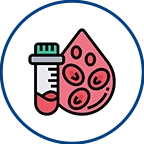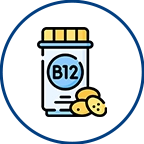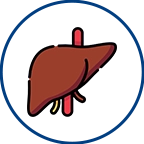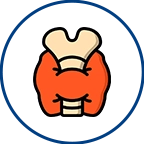Headache: Types, Causes, and Symptoms

Headaches are a common and often debilitating ailment that most people have experienced at some point in their lives. While they can range from mildly annoying to severely painful, understanding the different types, causes, and symptoms of headaches can help individuals better manage and even prevent them. In this blog post, we'll delve into the world of headaches to provide you with a comprehensive overview.
Home Sample Collection
Types of Headaches
There are various varieties of headaches, each with a unique set of traits and underlying reasons. Some of the most typical varieties are listed below:
Tension Headaches: These are the most prevalent type of headaches and often feel like a constant, dull ache on both sides of the head or at the back of the neck. Stress, bad posture, exhaustion, and tight muscles can cause them.
Migraines: Migraines are intense, throbbing headaches that are usually accompanied by other symptoms like sensitivity to light and sound, nausea, and sometimes even visual disturbances called auras. They can last for hours to days and often hinder daily activities.
Cluster Headaches: Cluster headaches are excruciatingly painful headaches that occur in clusters or cycles, usually over several weeks or months. They are confined to the area surrounding one eye and may be followed by weeping and redness of the affected eye.
Sinus Headaches: These headaches are often mistaken for migraines as they share similar symptoms. They are caused by inflammation of the sinuses due to allergies, infections, or congestion, leading to pain and pressure in the forehead, cheeks, and nasal areas.
Hormone Headaches: Hormonal fluctuations, often associated with menstruation, pregnancy, or menopause, can trigger headaches in some individuals. These headaches usually occur as migraines and are linked to changing estrogen levels.
Causes of Headaches
Understanding the underlying causes of headaches can provide insight into how to manage and prevent them. While the causes can be varied, here are some common triggers:
Stress: In those who are sensitive, emotional or physical stress can cause muscle strain, tension headaches, or even migraines.
Dietary Factors: Certain foods and drinks, such as aged cheeses, processed meats, caffeine, and alcohol, can trigger headaches, especially migraines.
Dehydration: Inadequate fluid intake can lead to dehydration, which can, in turn, cause headaches.
Sleep Issues: Headaches can result from both too much and too little sleep, as well as from having poor quality sleep.
Environmental Factors: Headaches, especially migraines, can be brought on by bright lights, loud noises, strong scents, and climatic changes.
Hormonal Changes: Fluctuations in hormones, often associated with menstrual cycles, can lead to hormone-related headaches.
Medical Conditions: Underlying medical conditions such as sinus infections, high blood pressure, and temporomandibular joint (TMJ) disorders can contribute to headaches.
Symptoms of Headaches
Different types of headaches present with distinct symptoms, but some common indicators include:
Pain: The most noticeable symptom of a headache is pain, which can range from mild discomfort to severe, debilitating agony.
Location: The location of the pain can vary depending on the type of headache. Tension headaches often affect the forehead and back of the head, while migraines can be one-sided and pulsating.
Duration: The duration of a headache can range from a few minutes to several days, depending on the type and its triggers.
Associated Symptoms: Nausea, vomiting, sensitivity to light (photophobia), sensitivity to sound (phonophobia), and visual disturbances (auras) can accompany certain types of headaches.
Aggravating Factors: Certain activities, foods, or environmental factors may worsen the pain of a headache.
Managing and Preventing Headaches
While some headaches are unavoidable, there are steps you can take to manage and prevent them:
Identify Triggers: You can improve your lifestyle by keeping a headache diary to help you spot patterns and probable triggers.
Practice Stress Management: To alleviate stress, use relaxation techniques like yoga, meditation, and deep breathing.
Stay Hydrated: Throughout the day, consume enough water to avoid dehydration, which is a frequent headache cause.
Maintain Regular Sleep Patterns: Ensure you're getting adequate and consistent sleep each night.
Limit Trigger Foods: Cut back on foods and drinks that are known headache triggers, especially for migraines.
Create a Supportive Environment: Minimize exposure to bright lights, loud noises, and strong odors when possible.
Consider Medications: Over-the-counter pain relievers or prescription medications, may aid in headache pain management when used in accordance with medical advice.
Conclusion
In conclusion, headaches are a common ailment that can significantly impact one's quality of life. By understanding the types, causes, and symptoms of headaches, individuals can take proactive steps to manage and even prevent them. If headaches become frequent, severe, or interfere with daily activities, it's advisable to consult a medical professional for proper evaluation and guidance.
Frequently Asked Questions
What are the different types of headaches?
Tension headaches, migraines, cluster headaches, sinus headaches, and hormone headaches are just a few of the different forms of headaches.
What causes tension headaches?
Muscle tension, stress, bad posture, eyestrain, dehydration, and lack of sleep are some of the common factors that contribute to tension headaches.
What distinguishes migraines from other types of headaches?
Intense, throbbing pain, typically on one side of the head, is a hallmark of migraines. They frequently come with sensitivity to light, sound, and nausea, and occasionally they are preceded by auras, which are visual disturbances.
What triggers migraines?
Migraine triggers can include certain foods (e.g., aged cheese, processed meats), caffeine, alcohol, hormonal fluctuations, stress, lack of sleep, weather changes, and sensory stimuli like bright lights and strong odors.
How are cluster headaches different from migraines?
Cluster headaches are excruciatingly painful headaches that occur in clusters or cycles. They are usually localized around one eye and are often accompanied by redness, tearing of the eye, and nasal congestion.
Can sinus issues really cause headaches?
Yes, sinus headaches can be caused by inflammation or congestion of the sinuses due to allergies, infections, or other sinus-related problems.
What role do hormones play in headaches?
Hormone-related headaches, particularly migraines, can be brought on by hormonal changes, such as those that occur during menstruation, pregnancy, and menopause.
When should I be concerned about my headaches?
If your headaches are severe, persistent, or accompanied by other symptoms like neurological problems, vision changes, or vomiting, you should consult a doctor. Additionally, a medical expert should be consulted if you experience sudden, severe headaches or ones after a head injury.
Can lifestyle changes help prevent headaches?
Yes, maintaining a healthy lifestyle by staying hydrated, managing stress, getting regular sleep, and avoiding trigger foods can help prevent certain types of headaches.
How can I determine the cause of my headaches?
You can keep note of potential triggers and patterns by keeping a headache diary. It's advised to see a doctor if your headaches persist or get worse so they can be properly diagnosed and treated.
Book Your Slot
Our Locations Near You in Hyderabad
3KM from Banjara Hills
1.9KM from Yusufguda
3KM from Madhura Nagar
5KM from Shaikpet
Profiles
- Cardiac Risk Profile
- Pituitary marker Profile
- Rheumatoid Arthritis Profile
- Dengue Fever Panel
- Lung Cancer Panel 1 Complete Molecular
- Gastroenteritis Screening Panel
- Thyroid Profile (T3,T4,TSH), Serum
- Pancreatic Marker Profile
- STD profile
- Androgen Profile
- Lipid Profile, Serum
- Pancreatic(acute)Profile
- PCOD Profile
Radiology
Pathology Tests
- Glucose Fasting (FBS),Sodium Fluoride Plasma
- Creatinine, Serum
- Glycosylated Hemoglobin (HbA1C)
- Vitamin B12 (Cyanocobalamin), Serum
- Thyroid Stimulating Hormone (TSH) Ultrasensitive, Serum
- Complete Urine Examination (CUE), Urine
- Liver Function Test (LFT),Serum
- Dengue (IgG & IgM), Serum
- Dengue Antigen (Ns1) Rapid, Serum
- C-Reactive Protein (CRP), Serum
- Widal (Slide Method), Serum
- Total IgE, Serum




